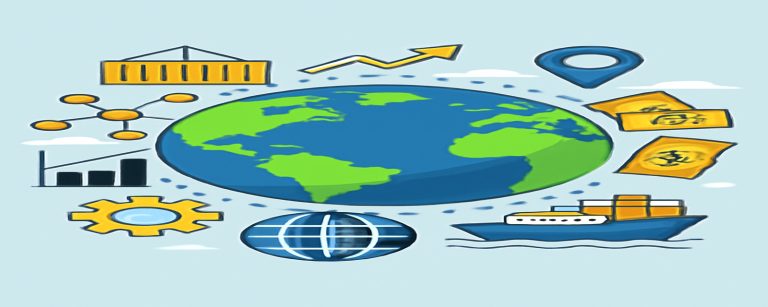The characteristics of globalisation incorporate several features that portray the interconnectedness of the economies, cultures, and societies worldwide. Globalisation is the process by which countries, businesses, and people become more interconnected with one another through exchanging goods, services, information, and culture. This phenomenon has revitalized economies, affected political systems, and transformed people’s daily lives across the globe. Knowing the characteristics, benefits, and drawbacks of globalization informs one about its vast impact on society in general.
What is Globalisation?
Globalisation is the integration process that connects economies, societies, and cultures by widening the scale of exchange and communication across borders. It consists of the movements of goods, services, capital, people, and information around the world and therefore ties it up into a more interconnected and interdependent world. Globalisation allows a country to import ideas and technology from others for better innovations. It has been driven by developments in transportation, communication, and trade policies that have lowered barriers between nations, thus making it easier for businesses and individuals to interact globally.
Globalisation has modernised the world globally—from operations of business to persons’ lives in different corners around the globe.
Key Characteristics of Globalisation
The characteristics of globalisation highlight how this process has created a complex, interconnected world. These characteristics reflect the economic, cultural, political, and technological dimensions of globalisation and illustrate its multifaceted impact.
- Interconnected Economies: Globalisation has led to the formation of a global economy where national markets are interlinked. This interconnectivity is evident through international trade, foreign investment, and multinational corporations operating in multiple countries. Economic integration fosters collaboration, increases competition, and drives the flow of goods and capital, benefiting both developed and developing nations.
- Free Flow of Goods and Services: One of the defining features of globalisation is the reduction of trade barriers, allowing goods and services to move freely across borders. Agreements such as the World Trade Organization (WTO) facilitate this process by encouraging fair and open trade practices. This free flow supports the idea of comparative advantage, enabling countries to specialise in the production of goods they produce most efficiently and trade for others.
- Cross-Border Movement of People: Globalisation promotes labor mobility, encouraging individuals to migrate for work, education, or better opportunities. Immigration has contributed to workforce diversity and brought new skills to economies, but it has also created challenges around immigration policies and cultural integration.
- Technological Advancement and Communication: Technology is at the core of globalisation, as advancements in communication, transportation, and information sharing have made it possible to connect across vast distances instantly. The internet and social media allow information to be shared globally, while innovations in transportation facilitate rapid movement of goods and people. Digital globalisation has also enabled remote work, e-commerce, and global marketing, further blending economies and cultures.
- Cultural Exchange and Homogenisation: Through globalisation, cultures blend, resulting in the spread of ideas, customs, and lifestyles. However, it also leads to cultural homogenization, where local traditions may be overshadowed by dominant global cultures, often influenced by western media, fashion, and consumer goods. Cultural exchange fosters understanding, tolerance, and appreciation but can also lead to a loss of cultural diversity.
- Political Interdependence: Globalisation fosters political collaboration, as countries work together to address global issues such as climate change, health pandemics, and economic crises. International organizations, such as the United Nations and the International Monetary Fund, play a crucial role in fostering cooperation. However, political interdependence can also result in tensions when international regulations or policies conflict with national interests.
- Environmental Impact: Globalisation has both positive and negative environmental effects. Increased production and consumption contribute to environmental degradation and climate change, but they have also led to greater environmental awareness and cooperation on issues like sustainable development.
These characteristics define globalisation’s role in shaping a globally connected society, with impacts that reach every aspect of modern life.
Merits of Globalisation
The merits of globalization outline the positive effects it has on economies, cultures, and individuals. Globalisation has accelerated economic growth, increased access to goods and services, and fostered cultural and technological exchange.
- Economic Growth and Development: Globalisation stimulates economic growth by expanding markets, attracting foreign investments, and promoting job creation. Developing countries benefit from improved infrastructure, access to technology, and opportunities for skill development.
- Increased Consumer Choices: Globalization gives consumers access to a diverse range of goods and services from around the world. This variety enhances quality, lowers prices through competition, and improves living standards.
- Technological Advancement: Globalisation drives innovation by enabling companies to share knowledge, research, and development. Access to new technology boosts productivity and economic progress.
- Cultural Exchange and Understanding: Globalisation promotes cultural diversity, fostering tolerance, understanding, and appreciation of different traditions and lifestyles.
- Improved Quality of Life: With better access to goods, services, and employment opportunities, globalisation enhances quality of life, especially in developing regions.
Globalisation brings significant advantages that drive economic prosperity, technological progress, and cultural enrichment, contributing to a more interconnected world.
Demerits of Globalisation
Despite its benefits, there are several demerits of Globalisation that pose challenges to economies, cultures, and the environment. Understanding these drawbacks provides a balanced perspective on globalisation’s impact.
- Economic Inequality: Globalisation can widen the gap between rich and poor. While multinational corporations and wealthy nations benefit, low-income countries and small businesses may struggle to compete, leading to inequality.
- Loss of Cultural Identity: The spread of dominant cultures can lead to the erosion of local traditions and cultural practices, as globalisation often promotes a homogenised global culture.
- Environmental Degradation: Increased production, consumption, and transportation lead to pollution, resource depletion, and climate change, creating environmental issues that impact global sustainability.
- Job Displacement and Outsourcing: Companies may move operations to countries with lower labor costs, resulting in job losses in developed countries. Outsourcing also creates job insecurity and affects working conditions.
- Political Tensions and Dependence: Globalisation increases interdependence, which can lead to political conflicts when national interests collide with global regulations, policies, or economic dependencies.
- Exploitation of Labor: In pursuit of lower costs, some companies exploit labor in developing nations, leading to poor working conditions, low wages, and a lack of workers’ rights.
The drawbacks of globalisation highlight the need for responsible policies, ethical business practices, and international cooperation to ensure equitable and sustainable growth.
Conclusion
Characteristics of Globalisation illustrate the vast and varied impact this phenomenon has had on economies, cultures, and societies worldwide. Globalisation has brought economic growth, technological innovation, and cultural exchange, enhancing connectivity on a global scale. However, it also presents challenges such as economic inequality, cultural homogenisation, and environmental issues. By understanding both the merits and demerits, policymakers, businesses, and individuals can work towards maximizing globalisation’s benefits while addressing its limitations. As globalisation continues to evolve, a balanced approach is essential to creating a fair, sustainable, and inclusive global community.
Characteristics of Globalisation FAQs
What drives globalisation?
Advances in technology, trade liberalisation, and economic policies drive globalisation, facilitating cross-border exchange.
How does globalisation impact developing countries?
It offers economic growth opportunities but also creates challenges like job displacement and cultural shifts.
What role does technology play in globalisation?
Technology enables instant communication, remote work, and global trade, making globalisation possible.
Can globalisation be reversed?
While difficult to reverse entirely, shifts in policies and global trends may reduce its pace or intensity in certain areas.
How does globalisation affect cultural diversity?
Globalisation promotes cultural exchange but can also lead to cultural homogenisation, impacting local traditions and values.


